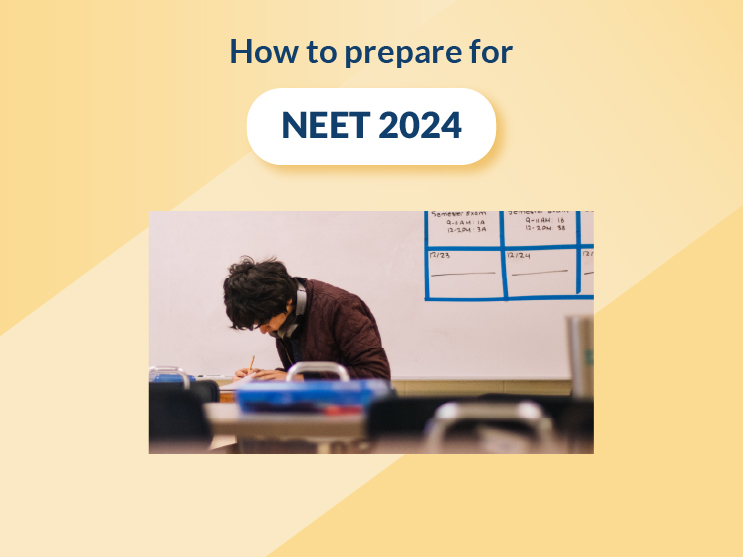The NTA or National Testing Agency conducts NEET-UG or the National Eligibility Entrance Test- a competitive examination for individuals seeking admission to undergraduate BDS and MBBS courses across India. Aspirants with dreams of making it big in medical science apply for the NEET examination.
If you want to apply for the examination, first know how to prepare for NEET 2024 and the basic details of the exam.
Besides BDS and MBBS, the other significant courses offered through the NEET examination include Unani Medicine, Ayurvedic Medicine, Veterinary Sciences, Animal Husbandry, and Siddha Medicine. The NEET score of a candidate is also used for BSc Nursing courses. Being highly competitive, NEET requires well-thought-out planning.
So if you wish to know how to prepare for NEET, understand the right strategy, and choose the best books to refer to. Some of the most important details that can help you with NEET exam preparation are as follows:
Age Criteria & Educational Qualification for the Applicants
As a NEET aspirant, your minimum age to apply for the exam is 17 years under All India Quota Seats and State Quota Seats. Earlier, the upper age limit for the examination was 25 years, along with a special relaxation period of 5 years for SC, ST, and OBC candidates.
However, as per the latest upper age restrictions, students above 25 can also apply for the NEET examination provisionally since the matter is pending judgement at the court.
Candidates applying for NEET Examination should qualify separately in Chemistry, Physics, Biology, and English, with 50% marks mandatory for general category students in subjects like Biology, Physics, and Chemistry.
Aspirants with plans to appear for NEET 2024 should have already started preparing because proper NEET preparation requires more than two years.
Now let us go through the step-by-step NEET preparation tips below:
Have a Clear Understanding of the NEET Exam Pattern
As an aspirant trying to understand how to prepare for NEET PG, the first thing you need to work on is understanding the NEET Examination pattern in detail. First, know that NEET is an offline, paper-pencil-based examination of three hours. The latest NEET examination pattern goes like this:
-
The NEET exam question paper consists of three sections, Chemistry, Physics, and Biology, with 200 questions. Out of these 200 questions, candidates need to answer a minimum of 180 questions.
-
Each subject division of the question paper has two further divisions or sections - Section A and Section B. Section A carries 35 questions, and Section B consists of 15 questions.
-
The candidates need to attempt ten questions out of the 15 questions in Section B, with each correct answer carrying four marks and one mark negative marking for each wrong answer.
-
The Chemistry and Physics sections carry 45 questions, respectively. In comparison, the Biology section further consists of sections like Zoology and Botany with 90 questions.
Know the NEET 2024 Syllabus Thoroughly
So, how to prepare for NEET from Class 9th? Know the NEET exam syllabus thoroughly. As a NEET aspirant, you would be better placed for success if you covered the NEET syllabus extensively and gave yourself sufficient time for self-assessment.
NEET syllabus is quite huge, and there are countless resources available. The first thing you must have in mind is cutting down on superfluous details or information while focusing on only the most important topics.
NEET examination usually covers the NCERT syllabus, which means preparing the NCERT topics will pay off in the long run. If you are thorough with the NCERT topics, it will help you save a lot of time in preparing for NEET because most of the NCERT and NEET syllabi topics coincide.
And you can use this saved time to concentrate on other, more advanced topics. The most important topics in each subject section of the NEET examination are as follows:
Physics |
Chemistry |
Biology |
| Laws of Motion | States of Matter | Genetics and Evolution |
| Gravitation | Basic Concepts of Chemistry | Diversity in the Living World |
| Thermodynamics | Equilibrium | Classification of Plants and Animals |
| Kinematics | Thermodynamics | Cell Structure and Function |
| Optics | Redox Reactions | Biotechnology |
| Work, Energy, and Power | Electrochemistry | Plant Physiology |
| Physical World of Measurement | Periodic Table | Reproduction |
| Atoms and Nuclei | Chemical Kinetics | Biology and Human Welfare |
| Current Electricity | Biomolecules | Human Physiology |
| Waves and Oscillations | Surface Chemistry | Ecology |
| Electrostatics | Polymers | Environment |
Choose the Right Study Materials
In your urge to know how to prepare for NEET in one month, understand that once you have a clear understanding of the NEET syllabus and pattern, it is important for you to choose the right study materials and books for proper NEET preparation.
Several books and study materials are available across the market, but making the right choice is vital. Manuals available from some of the leading institutes and sources are highly reliable resources. Furthermore, take the guidance and advice of your seniors and teachers when choosing the most useful study material.
You must choose books and study materials based on important factors, such as content; up-to-date information; edition; practice materials; language, and cost. NCERT books are a must if you are thinking about how to prepare for NEET from Class 10. Besides these, there are other top books you require to prepare for NEET 2024. These include:
Trueman's Objective Biology for NEET by MP Tyagi
ABC of Chemistry for Classes 11 and 12 by Modern
Fundamentals of Physics by Halliday, Resnick, and Walker
40 Days Biology for NEET by S. Chakravarty
40 Days Chemistry for NEET by Sudhanshu Thakur
40 Days Physics for NEET by S.B Tripathi
Start with the Preparations Early On
So, how to prepare for NEET from class 8? Start with the preparations early. Ideally, start preparing for the exam as soon as your Class 10 board examinations are over. However, it is a great idea to begin with, NEET preparation after Class 8. Preparation for two years, along with your Class 11 and Class 12 lessons, is a must to ensure thorough and complete preparation.
During these couple of years, you will get enough time to go through all the topics and chapters of the different subjects included in NEET. This will further help you build a clear understanding of all important concepts while you can keep practising and revising till the date of the examination.
Come Up With a Proper Time-Table
Simply contemplating how to prepare for NEET in 2 months, three, or six months will only work once you start the preparations most systematically. Since you would have to attend school while preparing for NEET, try and make the most out of your preparation by coming up with a proper timetable.
But you need more than simply creating a timetable to help you understand how to prepare for NEET after the 12th. Stick by the timetable to include everything important or lagging in preparation.
Make sure to come up with a customised and realistic timetable. Ensure your timetable is feasible enough to stick to it with utmost discipline. Create a diary and calendar, and always have your priorities in mind.
Set up long hours of study while taking regular breaks so that you can refresh your mind. But make sure you commit religiously to your set schedule and stay focused during study time. Getting sufficient sleep is also important at the same time.
Decide on the Right Coaching and Preparation Mediums
While preparing for NEET, make other important decisions to help you with your studies. Decide whether you will be self-studying for the examination or taking coaching guidance. While it is next to impossible to crack the NEET examination without coaching, you may even take up self-study in the first year of preparation and then go for coaching in the second year.
Self-study and proper coaching will help you provide the right guidance while exposing you to the competition level to crack this highly competitive examination. Besides self-study and coaching, you also have the option to refer to or join the online mediums of preparation available through different social media platforms, like Facebook and YouTube.
See the Previous Year's Question Papers
Going through and solving the previous year's question paper will give you the much-required exposure to different varieties of questions you can expect in the NEET Examination. Know about some of the most important chapters and topics and their weights. There is a dual purpose of referring to and solving the previous years' question papers on NEET. In the first place, it helps you practice a lot. Secondly, you also get an idea of the entire examination, question types, and topics. NTA, or the body that conducts NEET, releases set-wise NEET question papers along with answers. As a student, you can also download the NEET question papers online from various sources.
Know Your Strong and Weak Points
Knowing the NEET examination syllabus and pattern, you can identify your strong and weak points. You will know the sections where you can score well and those where you require more preparation. Or you can also take a complete mock test to understand your lowest and highest-performing sections. This will help you prepare accordingly and devote more time to your studies.
Proper Practice Is Very Important
Not just NEET preparation but practice is one of the most important aspects of preparing for almost any examination. Once you are done with the basic preparation, start practising. Initially, do not spend a lot of time practising; instead, start to solve topic-wise or section-wise questions or short practice question papers. Step-by-step practice can help you build momentum. After a few months of starting with NEET preparation, you can improve your preparation and then take up full-length practice tests. Practice a minimum of 100 questions every day. This can be a game-changer for you. Once you are done with self-assessment, get in touch with your mentors to clear all your doubts.
Build Confidence
Nothing is better than self-confidence when wondering how to prepare for NEET phase 2. Your self-confidence will boost you as a NEET aspirant and help you prepare for the examination and ace the exam accordingly. The ultimate belief that you have started with the exam preparations early on and have been moving on the right track of preparation will help you come up with flying colours. But while boosting your self-confidence to prepare and sit for NEET Examination, you must also take good care of your health while not paying attention to unwarranted rumours that can deviate and distract your mind.
Prepare Notes While You Learn
Make sure to get into the habit of making precise and meticulous notes while learning. This will aid your learning procedure and will also help you with the revision. At the same time, you must also maintain a mistake journal to record all the mistakes you are prone to along with your weak areas. This will help you get over all your shortcomings.
Do Not Miss Regular Revisions
Regular revision can help you perfectly master different topics, and the same goes for the subjects and concepts. When revising, emphasise the important areas while maintaining short notes. Revise all the formulas and their derivations thoroughly and go through all important equations, mechanisms and reactions in Physics and Chemistry.
To keep everything in mind, practice creating mind maps of all the chapters and using analogies, heuristics and mnemonics. These will help you learn and retrieve everything faster and memorise different terms in Physics, Chemistry and Biology. You can also opt for the best online NEET coaching in Bangalore to prepare well for the NEET examination.



